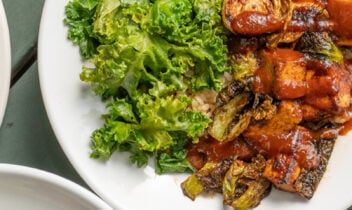TheBUZZ Lycopene promotes healthy skin.
WHAT THEY’RE SAYING
Lycopene in red tomatoes, carrots, papaya, bell peppers, pink guava, watermelon and pink grapefruit, may protect your skin from sunburn.
WHAT WE KNOW
Lycopene has been noted for its antioxidant qualities which prevent many types of cancers, especially prostate cancer. However, now this carotenoid is spotlighted for its skin protection abilities. Lycopene is a carotenoid found in tomatoes, carrots, watermelon, pink grapefruit and many other red-colored fruits and vegetables. Lycopene functions as a phytochemical that is involved in antioxidant functions in the body. It is also responsible for yellow, red and orange pigmentation of fruits and vegetables. New research shows lycopene as a component of a group of mechanisms that protect the skin from damage when exposed to UV radiation. This is known as photoprotection.
HOW DO WE KNOW THIS?
In several studies, lycopene has been shown to decrease the effects of skin damage from sunlight. A 2007 study reported in Molecular Biotechnology found that after 10-12 weeks of dietary intervention with beta-carotene and lycopene, there was a decrease in sensitivity to UV-induced erythema (reddening of the skin). This study concluded that dietary consumption of the micronutrients lycopene and beta-carotene may contribute to life-long protection against harmful UV radiation.¹
Another study published in the International Journal of Vitamin and Nutrition Research in 2005, studied the effect of a 12-week supplementation of tomato-based products rich in lycopene and their effect on UV light protection. Each week, the reddening of the skin after exposure to UV light was evaluated. There was a 25% decrease in skin erythema (reddening of the skin) in patients supplemented with tomato-based products rich in lycopene compared to those who were not supplemented.²
OUR ADVICE
Should you still wear your sunscreen? Yes! Currently, there is no substantial evidence that proves lycopene can be used to protect your skin from UV radiation. In fact, consuming a lycopene supplement instead of whole food can be problematic. However, remember red fruits and vegetables (and all fruits and vegetables) are full of vitamins, minerals, phytochemicals, and antioxidants that protect your body from many diseases and disorders.
Want to get the most out of your red fruits and vegetables? Lycopene is best absorbed by the body when red fruits and vegetables are crushed or cooked. Try new ways of preparing red fruits and vegetables; our tasty Baked Tomatoes is a good start. And check out our Top 10 Ways to Enjoy Tomatoes.
New research surfaces frequently about the health-promoting qualities of fruits and vegetables. So eating MORE fruits and vegetables is what really matters! In addition to eating more fruits and veggies, also remember to eat a variety of colors to give your body the best recipe of vitamin, minerals, and antioxidants to keep it healthy and disease free.
¹ Sies, H, Stahl, W. “Carotenoids and Flavanoids Contribute to Nutritional Protection against Skin Damage from Sunlight.” Molecular Biotechnology 37 no. 1 (2007): 26-30.
² Aust, O, et al. “Supplementation with Tomato-based Products Increases Lycopene, Phytofluene, and Phytoene Levels in Human Serum and Protects against UV-light-induced Erythema.” International Journal of Vitamin and Nutrition Research 75 no. 1 (2005): 54-60.
|


